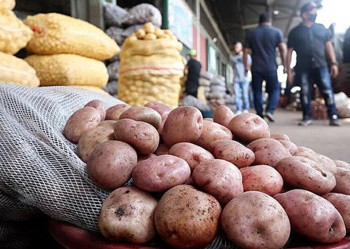Venezuela’s agriculture and drinks industries may be on the brink of collapse, business leaders warn, as domestic producers face insurmountable competition from a flood of cheap goods smuggled over the border from Colombia.
The president of Venezuela’s Center for Agri-Food Studies (Centro de Estudios Agroalimentarios – CEA) claimed that 60% of vegetables, 45% of hard spirits, and 35-40% of fertilizers used in the country were imported illegally, primarily from Colombia, putting up to 3.4 million jobs at risk. Other industry experts have reported even higher figures of smuggled goods entering the country.
As hyperinflation in Venezuela has driven food prices to inaccessible levels for much of the population, lower production costs in Colombia, partly thanks to subsidies, allow Colombian farmers to sell their goods at attractive prices. Those products are purchased and smuggled into Venezuela to be sold not only in border regions but even in the capital, Caracas. As a result, Venezuela’s farmers are being cut out.
SEE ALSO: Re-Opening Colombia-Venezuela Border No Quick Fix for Rampant Smuggling
Agricultural producers have protested over concerns, with potato growers complaining their industry has been particularly hard hit by unregulated, cheap, and in some cases disease-carrying Colombian imports.
“At this rate, there won’t be any potatoes grown in Venezuela in 2026,” CEA president Edison Arciniega told Venezuelan news outlet La Prensa de Lara.
Venezuela’s national soda industry is also at risk of being wiped out by the influx of low-priced, unregulated, and sometimes counterfeit Colombian soda, Carlos Palumbo, the executive director of the National Association of Soft Drinks (Asociación Nacional de Bebidas Refrescantes – ANBER) told InSight Crime.
“We could have up to 12 million liters of soda brought in illicitly with no guarantee … that it contains what the label says,” Arciniega added.
Smuggling has remained rampant in Venezuela despite the official reopening of the border with Colombia almost a year ago. Efforts to revive trade between the two countries have largely failed to curtail the activities of contraband networks that became deeply entrenched between 2015 and 2022, when a political dispute led to the closure of the border.
InSight Crime Analysis
While many in Venezuela view smuggled food as a lifeline, the dependence on contraband is weakening major industries and likely deepening the country’s economic decline.
By opting, out of desperation, for cheap, smuggled goods, Venezuela’s consumers are pushing agricultural workers and those in its food industry into a similar state of need. Smuggled Colombian potatoes had already led to 40,000 lost jobs in Táchira, Mérida, and Trujillo by October 2022, El País reported.
The Venezuelan government has sought to take a stance against contraband. Last year, authorities made a bumper seizure of 54 tons of contraband food that had allegedly arrived from across the Colombian border. In July this year, Vice President Delcy Rodríguez announced the creation of a commission against food smuggling.
SEE ALSO: In Venezuela, Contraband Networks Supply Rampant Wildcat Mining
The reopening of the Colombia-Venezuela border was expected to reduce smuggling. However, the illicit activity has continued to thrive, with an apparent level of tolerance among local Venezuelan authorities, who, in some cases, have gotten directly involved in food contraband networks.
In June, Brazilian authorities shut down a sausage smuggling network protected by Venezuelan customs officials, El Publique reported. Smugglers also bribe security officials or even guerrilla groups, such as the National Liberation Army (Ejército de Liberación Nacional – ELN), to ensure their contraband goes through.
Even with the full cooperation of Venezuelan officials, tackling smuggling will prove difficult. The country’s deep economic crisis, marked by hyperinflation, means there is a widespread demand for cheap food. For some, it is a matter of survival.
Between 2019 and 2021, Venezuela’s food crisis was the worst in South America, according to the United Nations, with more than a fifth of the population undernourished. In July of this year, a basket of basic foodstuffs for a family of five costs more than 100 times the monthly minimum wage in July 2023, according to financial news outlet Portafolio.
“They [smugglers] are a salvation because there is no other way for the state to provide this food to the population,” a teacher living in Zulia told InSight Crime.
As a result, and despite apparent government actions against contraband, the sale of smuggled foodstuffs remains rife, and the demand for cheaper goods is so high that formal traders have little option but to sell illegally smuggled goods.
“[Contraband food products] are openly available in stores, independent supermarkets, street markets,” Maracaibo Chamber of Commerce president Alessandro Nanino told InSight Crime.
Taking advantage of the lack of legal clarity, smugglers are able to bring in huge quantities of merchandise. Around 90 cooperatives from the Wayuu Indigenous community have permission to bring food from Colombia for their families. But many are in fact transporting far more goods than needed, said Nanino.
One smuggler based in Zulia, known as Sofía, told InSight Crime explained how these individuals known as listineros, will use their privileges to sneak in other merchandise.
“They bring the food at the top of the car, and they hide the cigarettes at the bottom,” she said.

